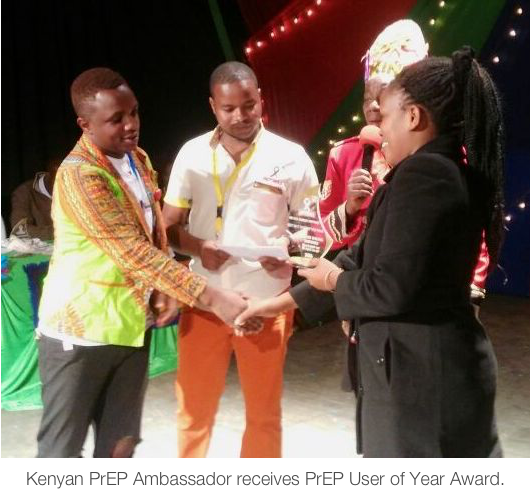September 26, 2016
It’s been five months since the first ever consultation about PrEP for gay African men was held in South Africa. (Yes, there was consensus at the meeting at the outset to use the term “gay men”, rather than MSM, and also to be clear that we were not addressing the specific needs of transwomen, an urgent and separate agenda.) It’s terrific to be able to share the meeting report from the April consultation, and to provide the first of a series of ongoing updates, in this case from Kenya and Uganda, about work to expand access to oral PrEP to all the Africans who need it!

From Kenya, the key population focused organization HOYMAS held their HIV/AIDS Champions’ Day in Nairobi on Monday this week. This year HOYMAS focused their HIV/AIDS Champions’ Day on highlighting the advocacy needs for new prevention options including oral PrEP. The event provided a platform for participants to exchange best practices, strategies for advocacy and ideas that advance the overall goal of prevention of HIV. One highlight from the meeting was when Brandon, who was named Kenyan PrEP ambassador by a Kenyan health organization known as LVCT, won the PrEP User of the Year.
Earlier in September, the Uganda LGBTQ community, led by Sexual Minorities Uganda (SMUG), held a meeting to discuss expanding PrEP access that put gay men at the center.
I am personally intrigued by the resilience of SMUG and of the entire Uganda LGBTQ community, even in the midst of the unrest. In the past six weeks alone, they have endured terrible police brutality at a Pride-related event, cancellation of the main Pride parade and ongoing harassment and stigmatization. In the midst of these rights violations, and their crucial work as human rights’ defenders, SMUG is also helping to ensure that the right to health is upheld. I salute them.
The September 9 meeting, held at a secure location, brought together about 25 participants from civil society organizations, members of Uganda’s LGBTQ community and members of SMUG. Some of the participants were attending a PrEP advocacy strategy meeting for gay men for the first time.
Richard Lusimbo from SMUG, the lead organizer of the meeting, reports that there was a deep sense of urgency within the members of the community who were at the meeting and others who were following on social media. You can get a sense of the lively discussion by searching #PrEP4MSM on Twitter he questions debated by meeting participants included: “Where has PrEP been?”, “Why don’t we have it yet?”, “How do we make this important prevention method available for our community now!?” Lusimbo noted, “The key word is ‘NOW.’” They want it now and they deserve to have access to it now!
The meeting participants stressed that community members need to be empowered with more education and information about PrEP. Many people are still confused about the difference between PrEP and PEP. PrEP stands for pre-exposure prophylaxis. It is an HIV prevention strategy in which HIV-negative people take an oral pill once a day before coming into contact with HIV to reduce their risk of infection. PEP stands for post-exposure prophylaxis. PEP is an HIV prevention strategy in which HIV-negative people take a short course of ARVs after possible exposure to reduce their risk of HIV infection. Basic questions that members of the community might be having about PrEP need to be asked and answered.
Some of the participants expressed the fear of continued stigmatization and homophobia in the country that might be heightened if PrEP is considered only for MSM. They stressed the need for PrEP to be rolled out for all populations at risk, as WHO has recommended, so that the Uganda government can support it without singling out specific populations.
Participants also expressed the need to come up with a clear communications strategy to inform the community about PrEP and to address misconceptions.
Further allies in PrEP advocacy in Uganda such as Health GAP helped members challenge the myth that lack of government funding in the short term should hold back implementation advocacy.
We are very excited about the ongoing PrEP advocacy and the work to create demand for prevention options for all populations in Africa, especially those most at risk. Ongoing collaboration with our Africa partners supports a broad and crucial effort—engage with national governments and other stake holders, advocate for the development of national PrEP guidelines and make sure there is community awareness of PrEP.
Watch this space for how the group moves forward in the weeks to come.